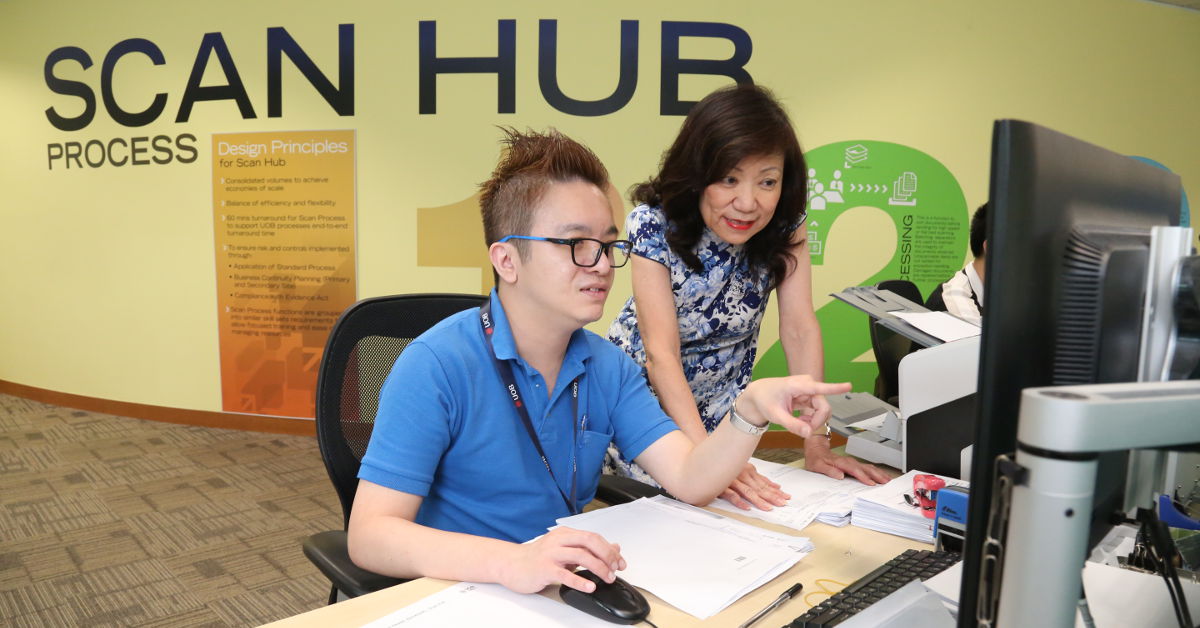You won’t believe this amazingly underrated way to improve productivity: UOB
01 Mar 2017

Faced with a tight labour market and a pool of largely untapped talent, United Overseas Bank Group (UOB) saw an opportunity to do some good even as it addressed a structural problem. In May 2013, it launched an “inclusive employment” initiative that would offer meaningful career opportunities for persons with special needs.
In particular, the local bank was looking to hire people with autism because they typically possessed abilities that they were after – a keen eye for details and accuracy in their work; a high level of concentration; as well as reliability and commitment.
Together with the Autism Resource Centre’s (ARC) Employability and Employment Centre, UOB redesigned work processes, modified its office environment and developed structured training programmes to enable persons with autism to work at its Scan Hub operations centre.
Scan Hub is the bank’s nerve centre for the checking, digitisation and archiving of customer documents. Employees who work here must possess a sharp eye for detail and a methodical approach – qualities that match the abilities of persons with autism.
“By focusing on an individual’s abilities and contribution in the workplace, we began our initiative with the firm belief that we were creating meaningful, long-term employment opportunities that would benefit both the Bank and the people we employ,” said Ms Agnes Wong, Executive Director, Centre of Excellence and Asset Management Operations Centre, Group Technology and Operations, UOB. She noted that Scan Hub was chosen for this programme as jobs at the centre were designed to be repetitive and in smaller job sizes.
To help ensure its new employees would succeed, UOB and ARC established selection, onboarding, training and counselling services. This involved the bank assigning work buddies to each employee to help them adjust to their working environment. ARC also placed job coaches onsite to guide the new hires on their daily work requirements and to train supervisors on how to best manage persons with autism.
“This is to help reduce employees’ learning curve and to enable them to achieve their performance objectives, if they have the aptitude and attitude to perform tasks that are structured and repetitive to begin with,” she said.
There are currently 17 employees with special needs working at UOB Scan Hub – 16 with autism and one who is hearing impaired. To identify potential candidates, ARC conducted a robust personality and job fit assessment programme based on the job requirements. Selected candidates then had to undergo both hard skills and soft skills training to prepare them to work in an office environment. UOB also created more visual job aids, two-way cabinets to organise document flow, as well as customised arrangements to accommodate the employees with autism. These changes have also benefitted the hearing impaired employee.
Along the way, UOB was focused on ensuring that the initiative had to be sustainable, and not merely another CSR activity. “Another chaIlenge faced was developing the right supervisory and engagement model to create an inclusive community within UOB Scan Hub,” revealed Ms Wong.
The results have been encouraging so far. Since redesigning the roles and hiring the team, employee turnover at UOB Scan Hub has decreased to 5 per cent in December 2015, compared with 50 per cent prior to 2013.
Overall work productivity has also increased. Some 40 per cent of employees performed above set KPls in January 2015 when output performance measurements were implemented. The score doubled by December the same year, with 80 per cent of employees performing above set KPls.
Meanwhile, the rest of the organisation has been receptive to the work being done at Scan Hub. “The UOB management and employees have been very supportive of this initiative as it is another demonstration of UOB’s continuous inclusive journey,” said Ms Wong.
The initiative has also won recognition outside of the bank. In July 2014,the programme’s “Target Operating Model” was graded as world-class by Kanchi, an Irish social enterprise that is committed to promoting inclusive business. UOB was also awarded the NTUC Model Partnership Award in May 2015 for its successful collaboration with ARC and SG Enable.
“The systematic and structured way in which UOB trains, places and coaches employees with special needs promises a sustainable and scalable employment model for other employers,” said Ms Denise Phua, President of ARC and Mayor of Central Singapore District.
“By focusing on each person’s abilities, the bank has shown how companies can achieve higher business productivity and strengthen the team culture,” SG Enable’s CEO, Ms Ku Geok Boon, added.
Going forward, UOB will continue to invest in developing training and career progression plans to help employees with special needs take on more responsibilities at the Scan Hub. The bank will also tap on SG Enable’s Open Door Programme – an initiative that provides employers with financial support to organise apprenticeships, to redesign jobs and to modify the workplace when they hire people with special needs.
“We offer ongoing cross-training opportunities as part of job enlargement and employee development to enhance their value contribution to the bank. With proper performance measurement, some employees have developed capabilities which have led to their promotion to the next job grade,” Ms Wong shared.
This article was abridged from the Business Times (26 Feb), p25, “Transforming the employment landscape”.